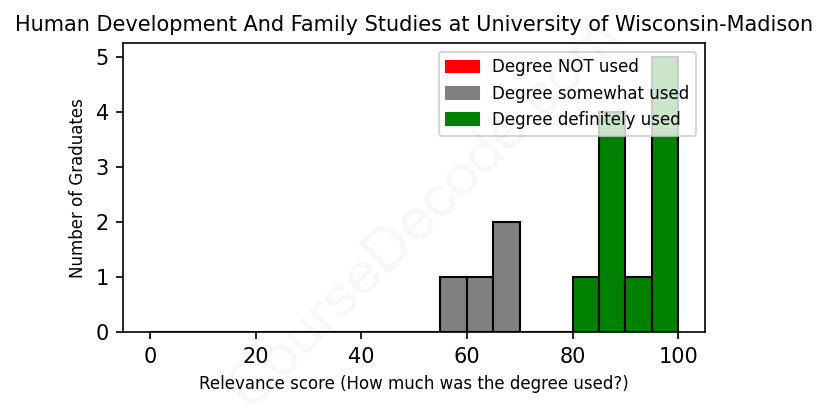
First, some facts. Of the Human Development And Family Studies graduates from University of Wisconsin-Madison we've analyzed , here's how many have used (or NOT used) their degree in their career:

These are estimates based on AI analysis of 15 LinkedIn profiles (see below).
The verdict? Significantly above average. Overall, with an average relevance score of 84%, Human Development And Family Studies graduates from University of Wisconsin-Madison have a much higher likelihood (+17%) of finding work in this field compared to the average graduate across all fields:
And for comparison, here's the chart for all profiles we've looked at across all degrees.
Also, after graduating, 53% of these graduates have pursued further education other than another Bachelor's degree (such as a Masters degree or other), compared to the average across all profiles of 35%. This suggests you may need more than just a Bachelors degree to be competitive as a Human Development And Family Studies graduate.
See the details:
|
Relevance score: 85% We think this person has gone into a career highly relevant to their degree. We think this person has gone into a career highly relevant to their degree.
DEGREE INFOGraduated in 2017 from University of Wisconsin-Madison with a Bachelor of Science - BS in Human Development And Family Studies. Also pursued further education since (see below). JOB HISTORY SINCE GRADUATIONLecturer University of Wisconsin-Madison Sep 2019 - May 2021 Postdoctoral Research Associate  University of Minnesota Sep 2021 - Apr 2023 Justice Researcher  RTI International Apr 2023 - Present FURTHER DEGREES DONE SINCE GRADUATINGDoctor of Philosophy - PhDUniversity of Wisconsin-Madison 2017 - 2021 Master of Social Work - MSW University of Wisconsin-Madison 2017 - 2020 ABOUTI am a Justice Researcher in RTI Internationals Corrections and Reentry Research Program. My research interests span correctional programming, reentry supports, and intervention development and testing, with specialized expertise in parental incarceration and child and family well-being. I am trained in both quantitative and qualitative research methods and have extensive experience conducting corrections and reentry-related program design, implementation, and evaluation studies. My multi-method research aims to provide data-driven evidence that informs program development and policy reform in order to facilitate racial, economic, and health equity for individuals and families impacted by the criminal legal system. I have a strong publication record in peer-reviewed journals and have disseminated my work to practitioner, policy, and general audiences through presentations, research briefs, and media interviews. I am a co-author of the book When Are You Coming Home? How Young Children Cope When Parents Go to Jail, which was published by Rutgers University Press.Before joining RTI, I completed a postdoctoral research fellowship in the Department of Pediatrics at the University of Minnesotas medical school after receiving my PhD and MSW from the University of WisconsinMadison, with a specialization in social policy and criminal legal research. |
The top 10 most common jobs done by the graduates we've analyzed (ranked most common to least) are:
People who graduated with a degree in Human Development and Family Studies from the University of Wisconsin-Madison have landed in a variety of jobs, but the most common ones tend to revolve around education, social work, healthcare, and child development. For instance, roles like teachers, social workers, and child life specialists are prevalent, indicating a strong alignment with the principles learned in their studies. These positions usually require them to apply their knowledge of human relationships, development, and family dynamics on a regular basis.
Overall, many of the jobs held by these graduates do relate directly to Human Development and Family Studies, particularly those involving children, families, and community support. However, some positions—like various HR roles or administrative jobs—seem to stray from the core focus of the degree. So while a good chunk of their career paths does stay true to their education, there's also a notable portion that doesn't utilize their specialized knowledge as directly. It's a mixed bag, with the relevant jobs providing rich opportunities to apply what they learned, while others may feel like a bit of a stretch in terms of relevance.
Here is a visual representation of the most common words in job titles for Human Development And Family Studies graduates (this is across all Human Development And Family Studies graduates we've analyzed, not just those who went to University of Wisconsin-Madison):

Graduates from the Human Development and Family Studies program at the University of Wisconsin-Madison often start their careers in roles that directly relate to their degree, such as teaching or working in social services. After graduation, many take positions as teachers, childcare workers, or social service coordinators, which align well with their studies in child development and family dynamics. For instance, those who graduated in 2011 and 2015 found initial jobs as infant teachers, case managers, and counselors, showing a strong connection to their area of study right out of college.
As time goes on, the career paths of these graduates tend to evolve but often stay within the broader scope of human development and support services. By the five- to ten-year mark, many have moved into specialized roles such as certified child life specialists or social workers, indicating a trend towards positions that require more responsibility and expertise. Even those who initially ventured into unrelated fields often returned to education or social outreach, showcasing a commitment to their degree's core values. Overall, while some graduates have diverse career trajectories, a significant number still find fulfilling careers relevant to Human Development and Family Studies, proving that the program provides a solid foundation for various professional pathways.
Honestly, a Bachelor’s degree in Human Development and Family Studies at places like the University of Wisconsin-Madison is generally considered to be on the easier side compared to some more technical fields, like engineering or chemistry. It’s very much about understanding people, families, and relationships, which can be pretty interesting and relatable material. You’ll have a mix of coursework that might include psychology, sociology, and even some research, but if you’re into those topics and enjoy writing papers or engaging in discussions, it’s not going to be a total grind. That said, every degree can have its challenging moments, especially with group projects or certain classes, but overall, it's pretty manageable for most students who are motivated and interested in the subject matter. Just stay organized, and you should be fine!
Most commonly, in the LinkedIn profiles we've looked at, it takes people 4 years to finish a Bachelor degree in Human Development And Family Studies.
Looking at the job histories of these Human Development and Family Studies graduates from UW-Madison, it seems like they’ve been working in a mix of non-profit, education, and healthcare roles, which tend to offer modest salaries, especially when starting out. The earlier careers, like case managers and teachers, often don’t pull in big bucks right away, especially considering some started as interns or in part-time positions. However, over time, some of them have started moving into more specialized roles, like a Certified Child Life Specialist or a Director of Admissions, which can offer better pay. Overall, while they might not be raking in tons of cash initially, it looks like there’s potential for better financial stability as they gain experience and possibly advance in their careers. So, they might not be rolling in it right now, but there’s hope for the future!
Here is a visual representation of the most common words seen in the "about" section of LinkedIn profiles who have a Bachelor degree in Human Development And Family Studies (this is across all Human Development And Family Studies graduates we've analyzed, not just those who went to University of Wisconsin-Madison). This may or may not be useful:

Here are all colleges offering a Bachelor degree in Human Development And Family Studies (ordered by the average relevance score of their Human Development And Family Studies graduates, best to worst) where we have analyzed at least 10 of their graduates:
| College | Score | Count |
|---|---|---|
 Oklahoma State University Oklahoma State University
|
91 | 10 |
 University of Wisconsin-Madison University of Wisconsin-Madison
|
84 | 15 |
 University of Wisconsin-Stout University of Wisconsin-Stout
|
83 | 22 |
 The University of Texas at Austin The University of Texas at Austin
|
81 | 14 |
 Virginia Tech Virginia Tech
|
80 | 12 |
 The Ohio State University The Ohio State University
|
77 | 12 |
 Penn State University Penn State University
|
76 | 34 |
 University of California, Davis University of California, Davis
|
76 | 18 |
 Kansas State University Kansas State University
|
75 | 17 |
 University of North Texas University of North Texas
|
74 | 12 |
 University of Illinois at Urbana-Champaign University of Illinois at Urbana-Champaign
|
74 | 12 |
 Brigham Young University Brigham Young University
|
73 | 28 |
 University of Connecticut University of Connecticut
|
72 | 22 |
 Michigan State University Michigan State University
|
71 | 18 |
 Texas Tech University Texas Tech University
|
70 | 26 |
 Colorado State University Colorado State University
|
69 | 41 |
 Bowling Green State University Bowling Green State University
|
69 | 18 |
 University of Rhode Island University of Rhode Island
|
69 | 14 |
 Oregon State University Oregon State University
|
68 | 28 |
 Washington State University Washington State University
|
67 | 16 |
 University of Arizona University of Arizona
|
62 | 13 |
 The University of Alabama The University of Alabama
|
62 | 10 |
 Arizona State University Arizona State University
|
61 | 29 |
 The University of Georgia The University of Georgia
|
61 | 17 |
 University of North Carolina at Greensboro University of North Carolina at Greensboro
|
58 | 14 |
 California State University San Marcos California State University San Marcos
|
49 | 12 |